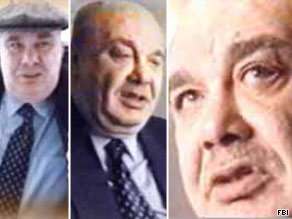Re: 10/21/09 -- [YBM Magnex] CNN: FBI: Mobster 'more powerful than a John Gotti'
FBI: Mobster 'more powerful than a John Gotti'
Story Highlights
- Semion Mogilevich accused of taking U.S., Canadian investors for $150 million
- FBI believes he moved on to manipulating international energy markets
- FBI: Mogilevich's business degree, large influence on nations make him dangerous
- Alleged Russian mobster known for his ruthlessness, power, business acumen

The FBI says Semion Mogilevich has been involved in arms trafficking, prostitution, extortion and murder for hire.
From Jeanne Meserve
CNN
Editor's Note: In an exclusive series this week on "Campbell Brown," the FBI has unveiled three additions to its list of the Ten Most Wanted Fugitives.
NEWTOWN, Pennsylvania (CNN) -- Semion Mogilevich may be the most powerful man you've never heard of.
The FBI says Mogilevich, a Russian mobster, has been involved in arms trafficking, prostitution, extortion and murder for hire.
"He has access to so much, including funding, including other criminal organizations, that he can, with a telephone call and order, affect the global economy," said FBI Supervisory Special Agent Peter Kowenhoven.
Mogilevich's alleged brutality, financial savvy and international influence have earned him a slot on the FBI's Ten Most Wanted Fugitives list, though he has lived and operated from Moscow, Russia, for years.
"He's a big man. He's a very powerful man," FBI Special Agent Mike Dixon said. "I think more powerful than a John Gotti would be, because he has the ability to influence nations. Gotti never reached that stature."
He is accused of swindling Canadian and U.S. investors out of $150 million in a complex international financial scheme. It centered on a firm called YBM, which purportedly made magnets at a factory in Hungary.
Authorities say the scheme involved preparing bogus financial books and records, lying to Securities and Exchange Commission officials, offering bribes to accountants and inflating stock values of YBM, which was headquartered in Newtown, Pennsylvania.
In a raid in 1998, FBI agents found a treasure trove of documents -- purchase orders, invoices, shipping orders, even technical drawings -- everything a legitimate business would produce.
But there was one thing missing.
"There were no magnets," Dixon said.
It was all a sham, investigators say.
"In essence, what his companies were doing was moving money through bank accounts in Budapest and countries throughout the world and reporting these to the investment community as purchases of raw materials and sales of magnets," Dixon said.
And because the company was publicly traded, anyone owning the stock would have made a lot of money.
"And of course Mogilevich controlled large, large blocks of stock from the outset, and he made a substantial amount of money in this process," Dixon said.
Investors lost millions into the pockets of Mogilevich and his associates. He and his associates were indicted in 2003 on 45 counts of racketeering, securities fraud, wire fraud, mail fraud and money laundering.
Russian authorities arrested him last year on tax fraud charges, but because the United States does not have an extradition treaty with Russia, he remains beyond the reach of U.S. law enforcement.
The FBI believes Mogilevich moved on after YBM and began manipulating international energy markets, giving him a large influence on other nations.
Dixon noted that Mogilevich had control or influence over companies involved in natural gas disputes between Russia and Ukraine.
Authorities say Mogilevich, who has an economics degree from Ukraine, is known for his ruthless nature but also for his business acumen, which led to his nickname "the Brainy Don."
"He has a very sophisticated, well-educated, loyal group of associates that he works with," Dixon said. "He hires top-notch consultants, attorneys, risk management firms to assist him and protect him in his criminal ventures."
Louise Shelley, an organized crime expert from George Mason University, says Mogilevich is a new kind of criminal.
"The major criminal organizations in Russia have not only tapped into people with economics degrees," Shelley said. "They've tapped into people with PHDs in finance and statistics who assist them."
Mogilevich is free on bail and no longer in Russian custody. The FBI hopes he will eventually travel to a country that has an extradition treaty with the U.S.
But, in case he doesn't, his wanted poster will be distributed all over Russia.
All AboutFederal Bureau of Investigation • Russia • Organized Crime
Find this article at:
cnn.com |




